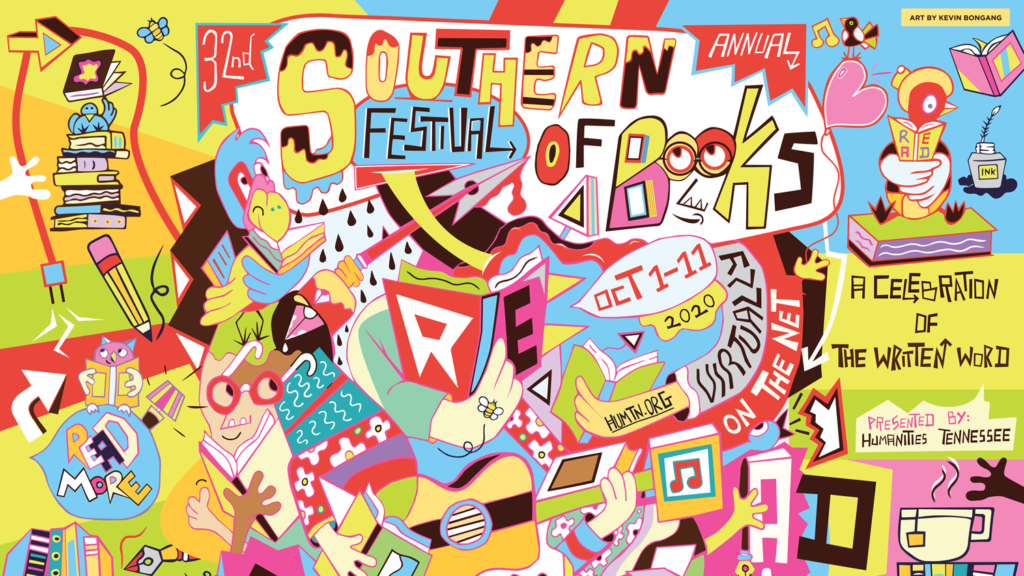
Cancel, delay — or get creative? Those are the options available to pretty much anyone who puts on live events these days.
Six months into the pandemic, the Southern Festival of Books is betting that an audience now more comfortable than ever with seeking out online connections will show up for a virtual edition of meeting authors and enjoying the company of other bookworms.
Or, that perhaps the internet will open the doors of the event to an entirely new crowd.
Traditionally, the festival is a weekend event with sessions held in the state’s legislative complex. This year, it will be online and spread over a week and a half, Oct. 1-11.
WPLN’s Nina Cardona spoke with Tim Henderson, executive director of the organization behind the festival, Humanities Tennessee.
Nina Cardona: Reading is, by nature, a solitary activity. And so one of the great joys of the Southern Festival of Books has always been the chance it gives book lovers to get together in person with each other, to meet authors face to face. How do you go about trying to create that feeling of togetherness when everyone is attending from home?
Tim Henderson: We knew from the onset we could not replicate that experience from the in-person format, but we could provide some opportunities through technology to have those moments of interaction which are really sort of central to the festival experience.
What we’re trying to do is create a sort of big tent, if you will, that will exist in one sort of virtual spot where participants can come together and be sure that they’ve got a few moments to interact with each other, to talk about what they’re reading, what they love about reading and to have that really important festival experience of interacting with authors.
NC: What are the events that will be happening virtually?
TH: Largely, it is what you’re used to seeing in our traditional format for the festival, and that is the all-important author sessions where you’ll be able to show up, if you will, virtually to those session rooms and hear authors reading from their own work, talking about the experience of writing or talking about the stories and very often talking with each other. We are hoping to provide a sort of flavor of the state throughout that week and a half, so we’ll have moments filmed or audio taped from around Tennessee, some sort of cultural flavor of the state. Since we’re now really envisioning this as truly a kind of festival without those geographic boundaries.
NC: So in some ways it offers you some new and different opportunities in terms of what you’re able to offer.
TH: Absolutely. Having participants come and take part from wherever they happen to be geographically, that’s really important. So we wanted to envision this as a sort of more accessible event in that sense. Another thing that is really important to us is thinking how we could reach out to the educational communities. During the weekdays we’re going to have lunchtime programming, middle-grade authors, YA authors, that sort of thing. That’s an opportunity we don’t get in our traditional format but that we were really able to get excited about and take advantage of because of the virtual format.
NC: It sounds like you anticipate this change in format will help broaden your audience. Do you worry that some of your longtime regulars will feel left behind by a virtual festival?
TH: I don’t know about worry. It’s certainly a concern, but it was very important for us to have that show go on. We wanted to be sure that no one felt left behind. Now, it does create, obviously, a different kind of divide. There’s obviously a digital divide there. We have tried to admit what it is we’re losing with the traditional format and not try to replace that as much as just sort of think how we can embrace this new format and see how we can expand that audience. So, it’s been a sort of balance of what we know we’re not able to replicate and we’re losing versus what we think we can offer that is really new and exciting for the festival.
NC: As we’ve had to make all these adjustments due to the pandemic, we’re anticipating after it’s all over that there will be a new normal, that things will never be exactly the same. Are there things that you’re developing that could become a piece of the festival in the future?
TH: One of the things that we’ve been really conscious of is sort of earmarking those new components that we’re adding to see what kind of audience that can bring in and what sort of meaningful experience it can help create and what kind of space it can create for readers that the traditional format can’t really replicate. When we fully expect and look forward to being back in person, there still may be these sort of virtual components of this kind of program that we could continue to reach new Tennesseans.

